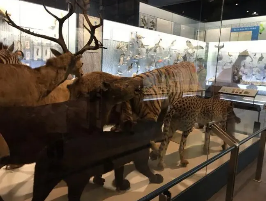Nature, the Source of Western Culture Starting with tigers and Rules
10 min read
Recently, an unexpected tragedy has led to a heated debate about rules and tigers. How do rules come into being? Why is there such a big difference (not gap) in the sense of rules between East and West? This article starts from the source of Western culture.Liang Shuming once talked about the three relations of man: the relationship between man and nature, interpersonal relationship, and the relationship between man and himself. Corresponding to these three relationships, there are three games: the game between man and nature, the game between others, and the game between himself. Playing games with other people makes sense, it’s part of game theory; To play with nature, that is, to take nature as the opponent of the game, to study how nature will play cards, and to play their cards accordingly; Playing games with oneself, from totemism to the so-called victory over the ego. Extending game theory to the three relationships offers a new perspective from which valuable insights may emerge.
Any human activity can be summarized into these three games, and at the same time, the three games are inseparable from each other. The game with nature, from hunter-gatherer to modern heaven and earth, involves, to varying degrees, the game between man and man, as well as the desire, will and ability of man, that is, the game with oneself. But at some point it’s going to be dominated by one of the three games.
Let’s start with one side of this game, nature.
Compared with the other two games, the game with nature has the following basic characteristics: nature is old enough to play the other side of the game to the end. In the same context, as long as the person playing with them plays the same card in the same way, nature will not change, and will always play the same card. This point in game theory is referred to as “repeated games” and “finite games”. Repeated games, not only in time, but also in space. Nature is not only old enough, but big enough to play with different players, so long as those players play the same cards, so is nature, or nature treats all players equally. With other people, it’s a different story. If you lose in the first round, will the second round be the same? Most will change tactics, “a shot to change the place”, is a “one-time game”; Even “no moves win”, this is the “infinite game”. In this case, so can only “not tired of war”. Perhaps it is for “ulterior motives” helpless, so can only ask for “peace is valuable”, “harmony without difference”, “seek common ground while reserving small differences”. As for the different “small difference”, can only ask for the “mean”, do not go to extremes. If the other side is a different person, the same game content, the result may be completely different. As for playing with yourself, one of the hard things is “knowing yourself”. This is one of three proverbs inscribed in the Temple of Apollo at Delphi, and has long been considered the hardest thing in the world. “The furthest from every man is himself” (Nietzsche). Second, a leopard cannot change its nature. Third, the heart has no two uses, it is difficult to distinguish between the two sides of the game. It was only in Jin Yong’s novels that I saw Zhou Botong fighting with his hands. Therefore, the simplest of the three games is undoubtedly the game with nature, which is “simple” because of “repetition” and “finite”.
Even if the same game with nature, there are also difficult to distinguish. Westerners look for the easiest opponent: measuring land and leverage, meaning that the opponent has almost the least “moves”, the most repeatable, with a few moves, can understand the opponent’s tricks. In contrast, if the opponent is animals and plants, their tactics are less than people, but also very complex.
Let’s look at the other side of the game, the person’s game strategy.
The game between man and nature can be understood at the level of cognition and practice. On the cognitive level, the cards in human’s hand in the game with nature include science, ethics, art and philosophy. Science “measures” what nature, as the opponent of the game, is “thinking”, what will nature react if human beings do so, and so on. The ethical impact is twofold. First, it excludes misbehaviour in research, encourages legitimate competition and innovation, establishes priorities and prizes, aims to establish the rules of the game for the human side of nature, incentivize participants, and ensure that this side is as “repetitive” and “limited” as the natural world. Second, to demand or conquer nature, or be kind to it; Is it human centered (and strong or weak), nature centered, or both human and nature centered. Ethical orientation will affect people’s mentality in the game with nature and thus the vision of scientific research. Therefore, in general, ethics does not directly point to the process of knowledge, namely scientific research, but exerts its influence on the links of practice, namely technology and engineering. It is the reflection and appeal of the relationship between man and nature after grasping the game strategy of nature. Art studies the enlightenment and perception of nature in aesthetics, which is the relationship between man and nature, but does not involve the game between them. Philosophy considers nature as a whole and the relationship between man and nature. Without science and technology, this kind of thinking would be difficult to deepen and even fall into fallacy. Of course, art does not directly involve the game between man and nature, but aesthetics can enlighten people; The value of philosophy in the game between man and nature is undeniable. All the same, it is science, not art or philosophy, that sits directly in front of a chess game, reading up on an opponent, pondering what cards to play in the face of certain parts and processes in nature at certain times.
In the game between science and nature, the first thing is to deprive the other side of infinite strategy. It is not possible to impose the emotion of the subject side such as “purpose” and various “miracles” on the other side, otherwise it is impossible to reveal and understand the strategy of nature. At the beginning of modern times, Da Vinci excluded teleology and recognized the necessity of nature as mechanical relations or mathematical proportions. Bacon agreed with Democritus, who believed that the cause of events was “physical necessity undisturbed by any ultimate cause”, which in its “continual invasion and incursion into the realm of physical causes overthrows and breaks everything”. Bacon clearly pointed out: “This cause (refers to the ultimate cause or the end cause) is obviously only related to human nature, and has nothing to do with the nature of the universe.” “Except those that involve human action, it does not advance science but only undermines it”.
Of the many “strategies” of science, the most important is arguably the experiment. Da Vinci believed that “experience is the father of all reliability” and experiment is the “mother of certainty” of knowledge. He realized that it was only through experimentation that the accidental and additive could be distinguished from the essential and fundamental. “The test must be run so many times that some chance will not disturb or distort the evidence.” Galileo realized that, through experiments, the researcher seemed to be asking nature questions that interested him and getting answers to those questions. He was also aware of the testing power of experiments, saying: “I am well aware that a single experiment or argument to the contrary would be sufficient to overturn these and many other possible arguments”.
The key point of the experiment is to define the object of the game, circle the boundary, draw the land as a prison, and control conditions: purification, simplification, exclusion of the interference of factors outside the game, plus reinforcement in a particular direction, and so on. The important thing is repeatability. The method of the experiment is to limit the opponent and what he or she does in the game, excluding the interference of factors other than the object of the study. As long as one side plays the same card in the new round, if the other side also plays (to a considerable extent) the same card in the previous round, it also reveals a strategy of the opponent. Da Vinci observed that “the same effect always arises from the same cause. If the cause is eliminated, the effect cannot be produced. In situations where experiments are inconvenient, thought experiments can also be conducted to some extent, such as removing air resistance, friction and other factors to simplify or even idealize problems. Scientists from Galileo to Einstein have been good at this. Experimental methods, allowing scientists to go beyond the prisoner’s dilemma in the face of nature a game, make the game between man and nature become repeated, and discover the other side under strict experimental conditions to apply a limited strategy, and discover such a strategy. Once nature has “given up” its strategy in such a game, it must be respected, and the next strategy can only be based on this.
Moreover, on the basis of the natural strategies they have mastered, they can also make some changes within a certain range to test the response of their opponents, and then repeat them in anticipation to see whether their response is expected. Hypothesize from insufficient phenomena or even clues. Hypotheses are no less important in scientific strategy than experiments, which are then designed to “calculate” what nature’s opponents will play under new circumstances, and then to modify the hypotheses and experimental schemes. The progress of science lies in the repeated comparison between experiment and hypothesis. It is the repeated comparison in such gradual progress that makes the game between man and nature become an evolutionary game from a repeated game. In this way, from simple to complex, step by step, nature’s strategy is gradually mastered by the side.
Zhao Dingxin believed that the game rules must be stable and the game chain must be long when he discussed that war brought about the modernization of Europe. In other words, the loser or onlooker must be able to sum up experience and then continue the game with the winner under the same rules. Only under such conditions can repeated and even evolutionary games occur. The game between man and nature is such a game.
At the practical level, the main force of the game against nature is undoubtedly technology (including engineering), with the addition of witchcraft and the like, and alchemy in between. There may be an undiscovered scientific component to witchcraft, but in general it is based on guesswork and wishful thinking. On the one hand, the nature faced by each practice is not certain, on the other hand, the state of the sorcerer is difficult to repeat, and there is no channel of communication between the sorcerer and ordinary people. Witchcraft, then, is a one-off and infinite strategy game between the uncertain individual wizard and the uncertain nature. As for daily life, although to a certain extent in primitive society, especially in the game with nature, due to the uncertainty of the object and the subject’s carelessness and often lack of corresponding knowledge, it is generally in a secondary or even marginal position, especially in the modern era with advanced science and technology.
There is an important concept in Hegel’s philosophy: “the cunning of reason”. In terms of technology, “rational dexterity” means that man takes nature as a tool and realizes his own purpose in the activity of transforming nature by using nature. “The subjective end, which is the power governing mechanical and chemical processes, in which the objective things consume and sublate each other, while standing outside themselves, and at the same time preserving themselves within them. This is the cunning of reason. “… Let things, on the one hand, affect and weaken each other according to their own nature, without directly interfering in the process, and yet at the same time achieve just its own purpose.” “Man’s cunning of reason enables him to resist the forces of nature with other natural things, subjecting them to the consultation of those forces, defending and preserving themselves behind them”. In game theory, it seems that in the game with nature, human beings are constantly “persuading” the other side’s power and building up their own.
It is the evolution of cognition and practice, as well as the combination of the two, that human beings start from the game with the simplest opponents — measuring land and leverage — and play it step by step with opponents that are increasingly difficult to deal with, that is, with less and less repeatability and more and more strategies — electromagnetic motion, chemical motion, and even the movement of life. And from the face of local, current and limited players, increasingly with the global, in the process and not limited to the opponent game.
Looking back at the tragedy of tiger wounding people, the root cause is disregard or even disregard for the rules. Behind the disregard and disregard is the traditional culture of thousands of years.






